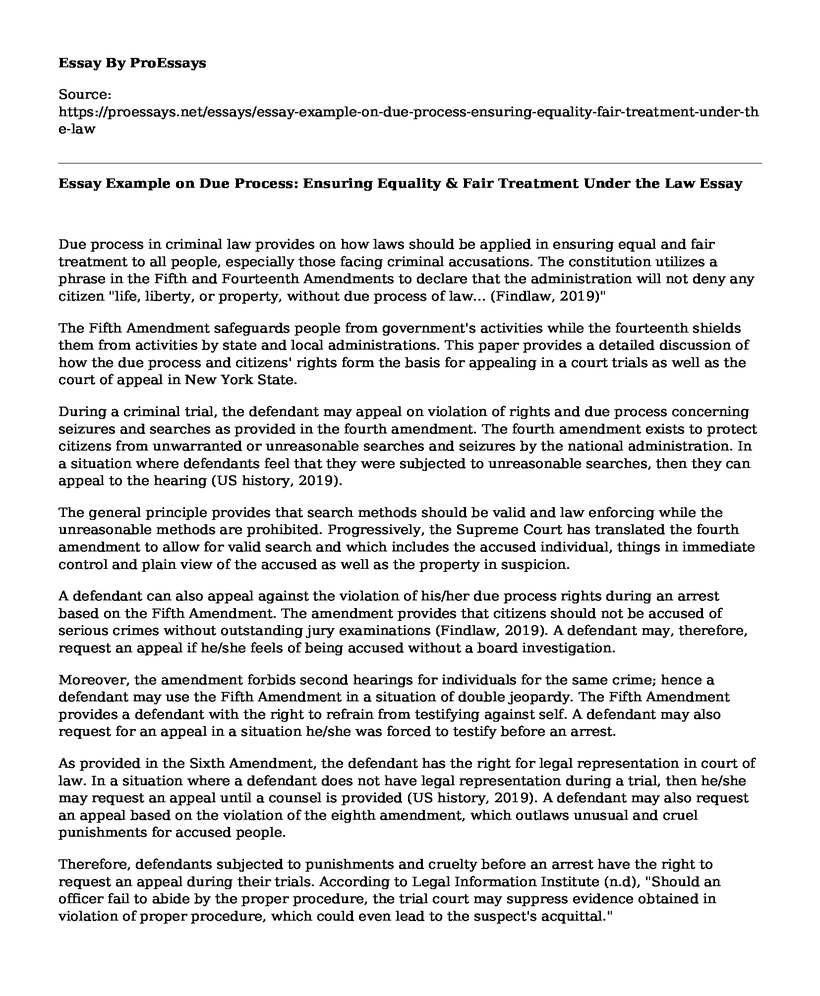Due process in criminal law provides on how laws should be applied in ensuring equal and fair treatment to all people, especially those facing criminal accusations. The constitution utilizes a phrase in the Fifth and Fourteenth Amendments to declare that the administration will not deny any citizen "life, liberty, or property, without due process of law... (Findlaw, 2019)"
The Fifth Amendment safeguards people from government's activities while the fourteenth shields them from activities by state and local administrations. This paper provides a detailed discussion of how the due process and citizens' rights form the basis for appealing in a court trials as well as the court of appeal in New York State.
During a criminal trial, the defendant may appeal on violation of rights and due process concerning seizures and searches as provided in the fourth amendment. The fourth amendment exists to protect citizens from unwarranted or unreasonable searches and seizures by the national administration. In a situation where defendants feel that they were subjected to unreasonable searches, then they can appeal to the hearing (US history, 2019).
The general principle provides that search methods should be valid and law enforcing while the unreasonable methods are prohibited. Progressively, the Supreme Court has translated the fourth amendment to allow for valid search and which includes the accused individual, things in immediate control and plain view of the accused as well as the property in suspicion.
A defendant can also appeal against the violation of his/her due process rights during an arrest based on the Fifth Amendment. The amendment provides that citizens should not be accused of serious crimes without outstanding jury examinations (Findlaw, 2019). A defendant may, therefore, request an appeal if he/she feels of being accused without a board investigation.
Moreover, the amendment forbids second hearings for individuals for the same crime; hence a defendant may use the Fifth Amendment in a situation of double jeopardy. The Fifth Amendment provides a defendant with the right to refrain from testifying against self. A defendant may also request for an appeal in a situation he/she was forced to testify before an arrest.
As provided in the Sixth Amendment, the defendant has the right for legal representation in court of law. In a situation where a defendant does not have legal representation during a trial, then he/she may request an appeal until a counsel is provided (US history, 2019). A defendant may also request an appeal based on the violation of the eighth amendment, which outlaws unusual and cruel punishments for accused people.
Therefore, defendants subjected to punishments and cruelty before an arrest have the right to request an appeal during their trials. According to Legal Information Institute (n.d), "Should an officer fail to abide by the proper procedure, the trial court may suppress evidence obtained in violation of proper procedure, which could even lead to the suspect's acquittal."
In New York State, verdicts from state trials can be appealed in appellate courts. According to the United States courts, the appellate courts give the final judgment of a case unless it sends the case back to the trial court for further proceedings or if by any chance the parties involved request the Supreme Court to review the case (Martella, 2018).
In New York, the CourtCourt of Appeals remains to be the highest Court of last resort for the majority of cases. If a judgment from the state trial court is appealed, the appeal hearings are conducted by the state's Court of appeal. However, if the ruling from the appeal court is appealed, the trials then proceed to the top-ranking courts in New York, the Supreme Court.
Examination of appeal in these courts is based on discretion hence limited to a small number of cases. Similarly, verdicts from federal trails court in New York are appealed in the intermediate appellate Court then later transferred to Court of Appeals within the state.
In New York State, the Appellate Division is the intermediate Court of appeal. The intermediate Court in this state has the authority to hear original proceedings started in it or transferred to it as per the law (Martella, 2018). The Appellate Division has jurisdiction to review discretion, fact and law arising in criminal and civil cases. It then takes appeals to the Court of Appeals, which is the highest in the state.
In a situation the parties involved lose cases in the Appellate Division, they may then appeal to the United States Court of Appeals, which is above the Supreme Court. Therefore, the Court of Appeals is the final court appellate in New York. The Court of Appeals in New York can exercise power over New York's state courts jurisdiction.
The Court of Appeals in New York has administrative powers to oversee the entire court system in the country (Martella, 2018). The Federal Court also has powers to oversee the conduct and ethics of the states' attorneys. The Court of Appeals has original authority over any criminal activities.
References
Findlaw. (2019, February 11). The Basis for a Criminal Appeal. Findlaw. https://criminal.findlaw.com/criminal-procedure/the-basis-for-a-criminal-appeal.html
Martella, M. H. (2018). Law 101: Fundamentals of the Law: New York Law and Federal Law. Lumen Learning - Simple Book Production. https://courses.lumenlearning.com/suny-monroe-law101/
US history. (2019). Crime and Due Process [ushistory.org]. US History. https://www.ushistory.org/gov/10c.asp
Cite this page
Essay Example on Due Process: Ensuring Equality & Fair Treatment Under the Law. (2023, Apr 09). Retrieved from https://proessays.net/essays/essay-example-on-due-process-ensuring-equality-fair-treatment-under-the-law
If you are the original author of this essay and no longer wish to have it published on the ProEssays website, please click below to request its removal:
- Essay Example - The Impact of Victimology
- Research Paper on Health Politics
- Relationship Between Genetics and Criminology
- Why Abortion Should Be Legalized Essay Example
- Essay Sample on Serial Killer: Dr. Henry Howard Holmes
- Essay Sample on California Courts
- UK Charity Hit by Cyber Attack: NCA Investigates Data Theft







